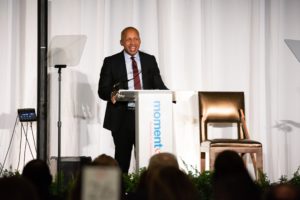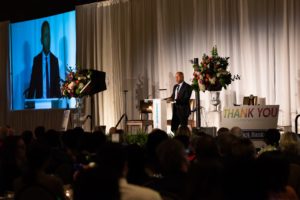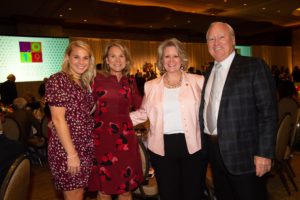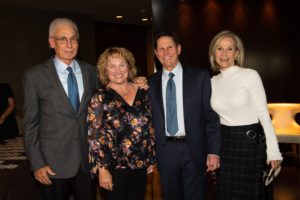Momentous Institute’s Changing the Odds Dinner Shines Light on Racial Justice and Equity
Have you ever been struck into silence after hearing a person speak about a topic that’s literally the foundation of their life’s work? I guess it is what the young kids today call “woke.”
I guess I was “woke” last week when I attended the annual Changing the Odds dinner to benefit Dallas’ Momentous Institute. And I wasn’t alone. More than 400 guests were brought to their feet to give roaring applause for keynote speaker Bryan Stevenson, founder and executive director for the Equal Justice Initiative.
Stevenson joined the Oct. 23 fundraiser to discuss his lifelong dedication to racial justice and to reform the U.S. justice and incarceration system, while urging them to play their part to help eradicate the past and present effects of racism on African Americans.
The moment Stevenson took the stage, he spoke from the book of Micah, where it talks about doing justice. “Whether you’re a person of faith or not, I do not think we are living at a time where our work with our children, our work to create healthier communities, our work to create safe space, can be effective,” he said.
“I believe there’s a deficit of justice in our nation, and that deficit creates imbalance and equity stress, and trauma, and strife. And so I think, it is worth thinking about how do we improve, how do we increase justice, how do we change the world.”
Before Stevenson took the stage, guests were welcomed by event chairs Carlos Peña and Ann Shaw, both members of the Salesmanship Club of Dallas, the organization that founded Momentous Institute.
Momentous Institute’s Executive Director Jessica Trudeau set the tone for the evening, highlighting Momentous Institute’s mission to change the odds for children using research-backed social-emotional health tools. But, Trudeau reminds us, for children to reach their full potential and to become changemakers, we must do better to provide equitable opportunities for all children.
“We believe that long-term sustainable transformation will not happen by Momentous Institute alone or the nonprofit community alone,” Trudeau said. “But rather, with all segments of our society – the corporate sector, faith community, public school systems, and government. Together we can shine light on these hidden factors and create a sustainably transformed community for the children of tomorrow.”
Stevenson went on to tell the crowd about his upbringing–growing up in a community where black children could not go to the public schools–and how lawyers came into their city and forced the school district to open up the classrooms to people of color. And how he went on to study law and came face-to-face with someone living on death row.
“I spent three hours talking to a man on death row; we were lost in conversation, and guards came in, and they started treating him badly, and I was trying to stop them from being so violent, and I couldn’t do anything about it. I was really worried,” he recalled. “I was standing there watching him, and he closed his eyes, and he threw his head back and started to sing, ‘I’m pressing on the awkward way, new heights I’m gaining every day, still praying as an awkward balance … Lord plant my feet on higher ground.’
 “The guards were pushing him down the hallway, you could hear the chains clanking and him singing about the higher realm, I’m here to tell you when I heard that man sing, everything changed for me. That was the moment I knew I wanted to help people get to higher ground.”
“The guards were pushing him down the hallway, you could hear the chains clanking and him singing about the higher realm, I’m here to tell you when I heard that man sing, everything changed for me. That was the moment I knew I wanted to help people get to higher ground.”
Stevenson said that when we get proximate to condemned men and women, we will see and hear things that allow us to understand what justice requires.
“The second thing we’re going to have to do is that we’re going to have to change some of the narratives that create barriers to caring and loving and taking care of people,” he added.
“We debate issues all the time: We’re debating immigration with debating public safety, being a whole range of things, but underneath the debates, there are narratives and the narratives of the things that can sometimes fuel and feed hatred and bigotry and bias, so we’ve got to understand the narratives. We’re going to have to change the narratives that are unhealthy that facilitate indifference to injustice and inequality.”
Stevenson went on to tell the crowd about cases he has been involved with where presumed guilty people were sentenced to the death penalty and freed; others who perished; and a 14-year-old boy who was charged as an adult and was grossly abused in an adult facility after shooting a man who allegedly abused his mother.
“This child was very small for his age. He weighed less than 100 pounds. He was under five feet tall, and he had never been in trouble before. He was actually a decent student. He was the kind of kid that might have been tried as a juvenile except for the fact that the man that he shot and killed was a deputy sheriff. Because he’s the deputy sheriff, the prosecutor insisted that this child be tried as an adult,” Stevenson said.
When speaking about trying children as adults and looking at them as if they are not children, the narrative created a little pipeline from our schools to our jails. “We were taking pre-adolescent children and putting them into detention facilities where they would be brutalized,” Stevenson said. “That narrative never got addressed. We have to change that narrative.”
 In addition to his work at EJI, Stevenson is a social activist, lawyer, and author of the New York Times bestselling book “Just Mercy,” which will soon be released as a major motion picture featuring Michael B. Jordan.
In addition to his work at EJI, Stevenson is a social activist, lawyer, and author of the New York Times bestselling book “Just Mercy,” which will soon be released as a major motion picture featuring Michael B. Jordan.
I can’t possibly recapture all that he said at the Changing the Odds dinner, but I will leave you with this final quote.
“I don’t believe the opposite of poverty is wealth; I believe the opposite of poverty is justice,” Stevenson said. “When we do justice, we deconstruct the conditions that belie poverty and suffering and inequality. And finally, I believe that our work, our stewardship as citizens of this country, will not ultimately be judged by what we do or the powerful and the rich. I think we’ll be judged by what we do for the poor the neglected and the abused. And because of that, the work at places like Momentous Institute is critical to work that we must commit to.”
Momentous Institute’s Changing the Odds conference welcomed 1,300 educators, mental health providers, and community leaders on Oct. 24-25 at the Omni Hotel. Nxt year’s Changing the Odds dinner will take place Nov. 4, 2020.











